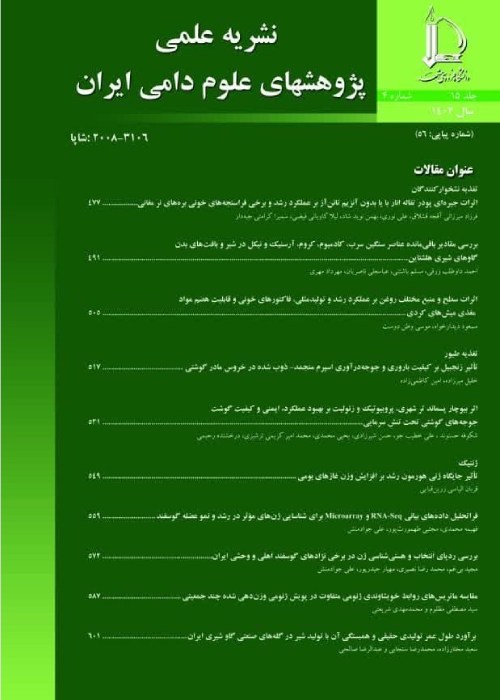Effect of Phytogenic Additive (XTRACT 6930) on Performance, Egg Quality and Some Physiological Parameters of Laying Hens
New alternatives for feed supplementation in poultry production are considered to improve animal health and quantitative and qualitative productivity by the phytogenic feed additives. Essential oils are a mixture of several compounds of herbal origin that can be used for animal feeding to improve its performance and health. Essential oils can act as stimulant agents of the immune system during acute or chronic inflammatory processes that can be characterized by an increase on the levels of serum globulins, which can express the metabolic and nutritional status of the animal. Moreover, essential oils may improve nutrient digestion and absorption by enzymatic stimulation and they also may exert positive effects when used in laying hens. The use of natural capsaicin extracted from red pepper has preventive effects on salmonella infection in laying hens. Cinnamaldehyde and carvacrol have also been shown to stimulate mucin secretion, thereby preventing the establishment of pathogens. These compounds in marjoram, pepper, thyme are antimicrobial agent against Clostridium spores. The purpose of this study was to evaluate the combination of essential oils of carvacrol, cinnamaldehyde, capsaicin on performance, egg quality, microbial population, blood parameters, immunity and reproductive parameters of laying hens.
This experiment was done with 120 laying hens (Hy-line W-36) at 70 weeks of age for 10 weeks including 2 weeks of habituation and 8 weeks of sampling in a completely randomized design with 5 treatments, 4 replicates and 6 birds per replicate. Experimental treatments included control diet without additives and diets containing 50, 100, 150 and 200 mg/kg phytogenic supplement containing carvacrol 5%, capsaicin 2% and cinemaldehyde 3% (made by Pancosma, France). Egg weight (gr), egg production (%) and egg mass (gr/hen/day) were recorded daily. Feed consumption was measured weekly and feed conversion ratio (FCR) was calculated weekly too. At the end of weeks 2, 4, 6, and 8 of the experiment, two eggs from each replicate were randomly selected for measurement the egg qualitative traits. To investigate the effect of phytogenic supplementation on the immune system, at the beginning of 6 and 8 weeks of the experiment, 0.5 ml of 20% sheep red blood cell suspension (SRBC) in saline phosphate buffer (PBS) was injected into the breast muscle of one bird from each replicate. After 7 days of injection, blood samples was analyzed for SRBC titer. At the end of the study, one birds per replicate were killed by cervical dislocation and blood was drawn from the jugular vein. Serum was separated after centrifugation at 4500 g and 4°C for 10 min, and frozen at −20°C until further analysis was conducted for blood biochemical parameters. Serum samples were analyzed for concentrations of low-density lipoprotein (LDL) and high-density lipoprotein (HDL), cholesterol, glucose and triglycerides using standard kits (Zist Shimi, Tehran, Iran) with an autoanalyser (Autolab PM 4000; Medical System, Rome, Italy). Then, caecal digesta (1 g) from each bird were aseptically transferred into 9 ml of sterile saline solution and serially diluted. Lactobacilli, Coliforms, and E.Coli were grown on Rogosa–Sharpe agar, MacConkey Agar, and Eosin Methylene Blue Agar, respectively. Plates for Lactobacillus were incubated anaerobically for 48 h at 37 °C. Microbial populations for E. coli and Coliforms were counted after aerobic incubation at 37°C for 24 hours. All samples were plated in duplicate.
The results of these experiments showed Feed intake and feed conversion ratio of the laying hens were not affected by dietary inclusion of different levels of phytogenic supplement. During the whole period of experiment, 100 mg/kg phytogenic supplement significantly increased egg weight and egg production. Egg quality traits including egg unit, yolk color, shell strength, shell weight, yolk weight, were not affected by phytogenic supplement but eggshell thickness of birds fed on 100 mg/kg of phytogenic feed additive increased significantly (P < 0.05). Cecal population of Lactobacillus was increased (P < 0.05) in birds fed various levels of phytogenic feed additive compared to control (P < 0.05). Blood parameters of glucose, cholesterol, triglycerides, HDL and LDL were not affected by the treatments. Different levels of phytogenic supplementation did not show significant effect on primary and secondary antibody response and reproductive parameters of laying hens. The results showed that not only the addition of 100 ppm of phytogenic additive to the diet of laying hens improves egg production percentage, egg weight and egg shell thickness, but also, increased cecal population of Lactobacillus.
- حق عضویت دریافتی صرف حمایت از نشریات عضو و نگهداری، تکمیل و توسعه مگیران میشود.
- پرداخت حق اشتراک و دانلود مقالات اجازه بازنشر آن در سایر رسانههای چاپی و دیجیتال را به کاربر نمیدهد.



